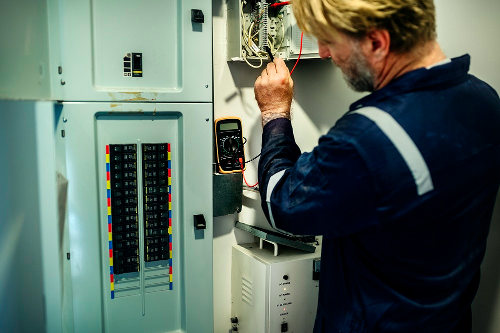Any trained tradesperson who plans, installs, maintains, and fixes the electrical systems and goods used in residences, commercial buildings, and industries is referred to as an electrician. Electricians maintain the safe and dependable operation of lighting, machinery, and appliances whether they are located inside or outside of buildings.

There are a variety of specialized electricians, such as residential electricians who install wiring and address electrical issues in residences and inside electricians who maintain and repair control systems, motors, and electrical equipment in commercial establishments and manufacturing facilities.
Responsibilities
As an electrician, it is your responsibility to transport electricity from its point of origin to the locations where residential and commercial users can use it. Depending on the area of specialization, this job’s precise duties could involve any of the following:
- Considering the optimal locations for electrical outlets, light fixtures, heating outlets, and ventilation systems while designing the electrical systems for new buildings.
- Examining and comprehending circuit diagrams, architectural blueprints, and other technical materials.
- Implementing municipal code-compliant wiring, lighting, and control systems in both new and existing structures.
- Constructing electrical circuits, verifying them after completion, and connecting electrical wires to fixtures and components.
- Setting up relays, circuit breaker panels, switches, and other electrical control and distribution hardware.
- Putting up hangers and brackets to hold up electrical goods.
- Executing maintenance procedures to maintain the functionality of the wiring, lighting, and control systems.
- Checking for defects in transformers, circuit breakers, and other electrical components.
- Using testing tools to determine why electrical systems and products aren’t working.
- Repairing, swapping out, and modernizing damaged or old electrical fixtures, wiring, and isolating problems for secure removal and replacement.
- Instructing other electricians to carry out particular tasks.
Environment at Work
Electricians may work on electricity and telecommunications systems outside or in buildings that are being built or renovated. They might be required to work in expansive or confined areas. If the right safety measures aren’t implemented, these working spaces can be highly dangerous because they frequently contain live electrical lines. When working on a project, electricians frequently work alone, but they may sometimes be a member of a bigger construction crew.
Electricians operate on a remote site for a specific amount of time, ranging from a single day to a few months, before moving on to the next task, unlike many employees who have a regular location of employment. Electricians’ houses may be far from their work locations. Electricians frequently travel more than 100 miles from their homes to complete jobs.
Work Schedule
Electricians have year-round employment options. Depending on what they do, their work hours change. Regular tasks are often completed by maintenance electricians in a standard 40-hour workweek. On weekdays, the majority maintain regular business hours and don’t frequently work on weekends, federal holidays, or late at night. Some electricians put in extra hours and work on call to solve critical issues.
Independent electrical contractors, on the other hand, don’t have the same set hours as the apprentice electricians who work for them. They could have a busy week and a week with fewer hours. The most flexible schedules are available to electricians when they work as independent electrical contractors or consultants.

What Skills Are Needed To Become An Electrician?
Education
One of the best careers you can get with just high school graduation or its equivalent is working as an electrician.
Electricians learn on the job rather than in a classroom to get a degree. This is frequently acquired through a four- or five-year apprenticeship program. A high school diploma or its equivalent, one year of algebra, and a minimum age of 18 are requirements for becoming an apprentice. Additionally, they must succeed on an aptitude test and screening for substance misuse.
Trainee electricians are required to complete 144 hours of technical training per year as part of their apprenticeship. During this time, they study blueprints, safety procedures, first aid, the requirements of the electrical code, algebra, and electrical theory. Additionally, each year apprentices complete 2,000 hours of actual on-the-job training.
Technical schools are less frequently attended by electricians. They cover circuits, safety procedures, and fundamental electrical knowledge in their training. Typically, an apprenticeship program will grant credit to graduates of technical schools.
Electricians must be licensed in the majority of American states. Information about each state’s licensing requirements can be found on the website of the National Electrical Contractors Association.
Over the course of their employment, electricians frequently undergo continual training. They can keep up with changes to the electrical code, new safety procedures, and instructions for handling certain products thanks to this.
Experience
Since degrees are not required for electricians, experience is more valuable than education. Because of this, a significant portion of apprenticeship programs across the nation emphasizes on-the-job training. It also explains why experienced electricians earn substantially higher compensation than recently hired workers.
As a result, only 2% of the workforce are electricians with under a year of experience. Most electricians have between 10 and 19 years of experience, making about 31% of the employment. A quarter of electricians have at least 20 years of experience, a second quarter has one to four years, and a third quarter has five to nine years.
This illustrates how important experience is to the job of an electrician. Throughout their careers, electricians who are passionate about their work should have plenty of possibilities.
Skills
To succeed in their jobs, electricians need a variety of technical abilities and character traits. Don’t undervalue the appeal of the following qualities to hiring managers, even if they aren’t often stated in a job description for an electrician:
- Understanding of electrical standards – For all installations and repairs, electricians must adhere to established standards.
- Understanding of mathematical and scientific principles – Although electricians don’t require highly developed mathematical or scientific abilities, they still use the fundamental ideas from these fields in their job.
- Strong cognitive abilities – These will aid electricians in deciphering and interpreting instructions, plans, and other technical materials they may be given in new job locations.
- Sharp eyesight and hand-eye coordination are essential for working with electrical systems, components, and goods since it requires precision, stable hands, and good vision.
- Independent worker – Although electricians may be a member of a bigger construction team, this is typically a lonesome job that suits individuals who like to work independently.
- Time management is crucial for electricians in order to finish their work efficiently and on schedule.
- Safety-consciousness is essential because electricians work in hazardous conditions where they run the risk of electric shocks and burns.
- Critical thinking – Following system and product testing, electricians use the information they’ve gathered to identify issues and choose the best remedies.
- Logical problem-solving abilities – When electrical systems and products malfunction, electricians must use logic to come up with solutions.
- Customer service abilities – Electricians can deal with both residential and commercial clients by being friendly.
- Physical stamina – Electricians frequently stand or kneel for long periods of time, which can be taxing on the body.
- Leadership qualities: As electricians advance in their careers, they will be expected to supervise junior and trainee electricians.

What is The Salary of an Electrician?
Everything depends on where they are and how much experience they have. Electricians at the entry-level typically make $21.25 per hour. Early on in an electrician’s career, the salary rises significantly. When an electrician has between five and ten years of experience under their belt, their typical salary is $49,000. The average yearly wage is currently $54,000. However, electricians in some of the most affluent markets in the country stand to earn significantly more.
For instance, the typical annual wage for an electrician in Boston, Massachusetts, is $86,000; in Chicago, Illinois; and in Seattle, Washington, it is $89,000.
Conclusion
Working as an electrician is particularly appealing to recent high school graduates due to the strong job growth and the prospect of a lengthy, secure career. An electrician may be the career for you if you have a logical mind and a talent for math and science. Find an excellent position as an electrician right away.